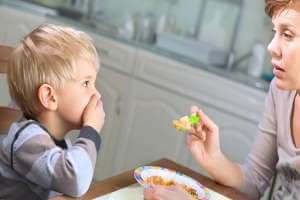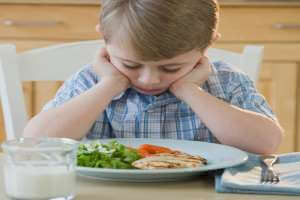Reject baby Eating can be frustrating for many parents. Your child may start to crave snacks or sweets instead of healthy foods. You may wonder if your child can survive on only crackers?

Before you fall into a pattern of mealtime battles with your child, keep in mind that a child refusing to eat is a common childhood behavior. In most cases, it is not due to anything major but instead results from completely normal things such as:
- Personal preference
- not feeling hungry
- unwillingness to try something new
- Common childhood illnesses (such as Sore throat or abdominal pain)
- holiday
Do you need: Different types of toys for the child's overall development?
Sometimes there are more serious issues at hand, and even if there aren't, you don't want the phase to turn into a lifelong habit, so it's important to understand why your child might refuse to eat, as well as ways to encourage a healthy relationship with food.
Is my child stubborn or is there a more serious problem?
When a child refuses to eat, the first thing many parents do is call the child. Insurgent But it's important to know what this actually means and that it's not the only reason why children are not allowed to eat.
A picky eater is usually difficult to eat certain types of foods or only wants to eat the same foods over and over again, while the rest of the family enjoys a variety of foods at a meal. The child may only want to eat chicken nuggets or peanut butter and jelly.
In many cases, children's refusal to eat is related to preferences. On the other hand, in addition to limited preferences, you may notice other problems, such as difficulty swallowing or chewing certain foods. While this is uncommon, it may be clear that your child is not just being stubborn. There may be an underlying issue at hand, which we will address later. Whatever the problem, you should not try to force a child to eat.
Prepare for success in overcoming a child's refusal to eat.
Here are some ideas that might encourage your child to eat:
Limit distractions during mealtime
Allowing tablets, smartphones, and TV viewing during mealtimes can cause a child to lose all interest in eating. Although it may seem like a way to keep them calm and occupied, it's best to restrict the use of electronic devices and other distractions during mealtimes.
Do you need: Food allergies in children - causes, signs, prevention?
You can work on this by putting your cell phone away as well. By focusing on food, conversation, and family bonding, it may be easier for your child to eat.
Also make sure you are relaxed while eating and that everyone has space to enjoy their meal. Use a booster or find a chair that fits your child properly so they are comfortable at the table.
Provide adequate food portions
The problem may not be that your child refuses to eat, but that they refuse to eat all the food on their plate. Remember that children don't need as much food as adults, so if you put too much food on their plate, they may not be able to finish the plate. This is not because they are being rebellious about eating, but because they may feel full. Try putting smaller portions of food in front of your child. They can always ask for a second helping. Also, remember that they may not be hungry in the first place.
Don't schedule meals too close to bedtime.
It can be difficult to get a sleepy, tired child to sit down to eat, so don't schedule meals too close to bedtime or too close to or after activity.
Relieve stress while eating
Forcing, pressuring, or yelling at a child to eat does not help the situation. Once a child becomes upset or starts crying, any chance of the child eating becomes impossible. So while you may want to encourage eating, do not put too much pressure on them.
Involve your child in preparing food.
Although many toddlers like the same foods day after day, variety can add excitement to the meal.
If you find yourself offering the same type of food over and over again — maybe even because your child asked for that food in the first place — changing things up will likely help.

Let your child help you choose new foods to try. Encourage them to help plan, shop, and prepare food. If children help prepare the meal, they may be more excited to eat.
Do you need: The harmful effects of air pollution on children's health and development?
Reducing food and drinks at times other than mealtimes
While eating, some children refuse to eat when they eat too much. snacks Or drinks during the day, children have small tummies, so it doesn't take much for them to become full.
If a child doesn't feel hungry at mealtime, they won't eat as much. So, while you don't want to deprive your child of food when they're truly hungry, you may want to discourage easy snacks—for example, a bowl of snacks on the table—which can lead to mindless eating and a very full belly at dinnertime.
Understanding your child's eating style
Depending on your child's eating style, they may need more or less food at different times of the day. So, while your child may refuse to eat at dinner, they may eat a lot at breakfast or lunch.
Is a child's refusal to eat a sensory issue?
To be clear, most of the things that might cause a child to completely — and perhaps frustratingly — refuse food are normal (welcome to parenthood), but there are some very rare issues, and more worrisome when they occur.
For example, some children rarely refuse to eat because they have sensory issues with food. While the child may not like it, eating that food does not cause sensory overload.
Children with sensitive issues may be sensitive to certain food textures or colors. These issues vary from child to child. For example, if a child only tolerates soft foods, he may gag when eating anything with a crunchy texture.
Do you need: Child care in winter - tips and advice
If your child has been diagnosed with a sensory issue that affects their ability to eat, addressing this may involve understanding your child and offering foods that appeal to their senses.
So, if your child can't handle green foods, but orange or yellow foods are fine, you can add more sweet potatoes and carrots to the menu.
Some children also benefit from feeding therapy, which can help them develop healthy eating patterns and behaviors. This type of therapy can help those who have difficulty chewing, swallowing, or eating certain materials, and address other food-related problems.
Is the problem an oral motor skill issue?
If your child has feeding difficulties, the problem may be with oral motor skills or a problem with the mechanics of eating. (Again, this is more rare than simply being a fussy eater, but some children do have it.)
With an oral motor skill problem, your child may cough or choke a lot while eating. This can cause stress or anxiety related to food, and if your child stops eating, it can lead to long-term nutritional deficiencies. Feeding therapy may also help your child overcome this problem.
Is the child's refusal to eat related to pain?
If refusing to eat is a relatively new problem, the problem may be something painful. This is more likely if your child is experiencing other signs of illness such as fever or diarrhea.
Instead of getting frustrated with your child, ask questions (if they're old enough to answer) to get to the root of the problem. Some issues that can make eating painful include:
- teething
- toothache
- acid reflux
- Sore throat
Constipation can make your child's tummy feel bloated, which can affect their appetite. Or your child may have a food allergy, experiencing mouth or stomach pain or gas after eating a certain food. As a result, they may start associating food with pain and refuse certain items.
Is a child's refusal to eat a behavioral issue?
Kids can be stubborn just to be stubborn (take a deep breath and remind yourself: this isn't necessarily a bad trait and may even be beneficial later on).
But sometimes deeper things happen. Has your child recently experienced a big change? Maybe the family moved to a new house or city, or maybe a family member or pet died.

Some children lose their appetite and stop eating due to a stressful situation. The good news is that refusing to eat in these situations is usually temporary.
Do you need: 6 tips to bridge the generation gap between parents and children?
Talking to your child about the situation and offering reassurance can help them feel better. Also, keep in mind that a child may stop eating as a way to exert some control over their life. However, mealtimes don't have to be a power struggle between parent and child. If you feel the primary issue is control, offer at least one food your child will eat. Don't overdo it by insisting that the child finish the entire plate. The more you insist that the child eat, the more likely they will refuse to eat.
Is a child's refusal to eat an eating disorder?
can develop Eating disorders In children, one rare type that can affect a child is restrictive food intake disorder.
This is when a child's refusal and restriction of food becomes so severe that the child suffers from nutritional and energy deficiencies. Children with this disorder have difficulty maintaining healthy growth, and their food avoidance affects other areas of their lives, such as school and relationships.
Some older children may also suffer from bulimia or anorexia. Possible signs of an eating disorder can include:
- dizziness
- fainting
- hypothermia
- weight loss
- worry
- vomiting
- slow growth
- brittle nails
- hair loss
If you suspect an eating disorder, talk to your child and bring these concerns to their attention. Refusing to eat is a common parenting challenge. This can cause a lot of anxiety for parents, but it is usually normal, often temporary, and goes away on its own.
Do you need: The importance of functional play in the child's growth and development?
While normal fluctuations in a child's appetite can be a root cause, they aren't always the sole cause. Depending on how long the problem has been going on and the other symptoms your child is experiencing, it may actually be the result of another issue that needs to be addressed. Finding ways to address food refusal in a positive way can help resolve the problem and lead to happier mealtimes, but if you suspect underlying issues that are out of the ordinary, talk to your child's pediatrician.
the source : What Can You Do If Your Child Refuses to Eat Anything?










